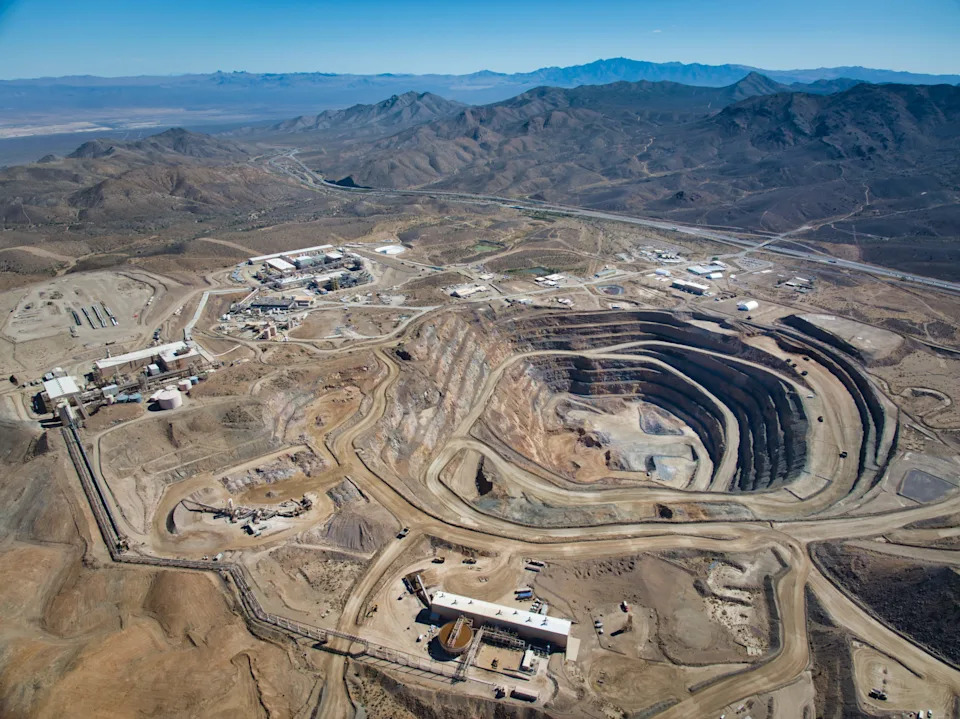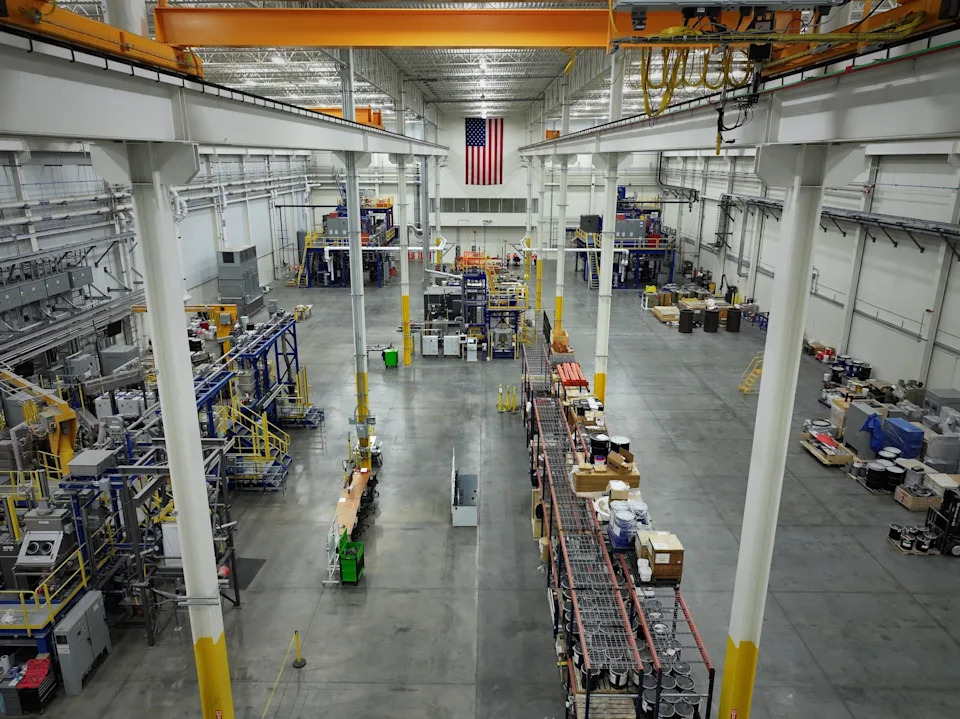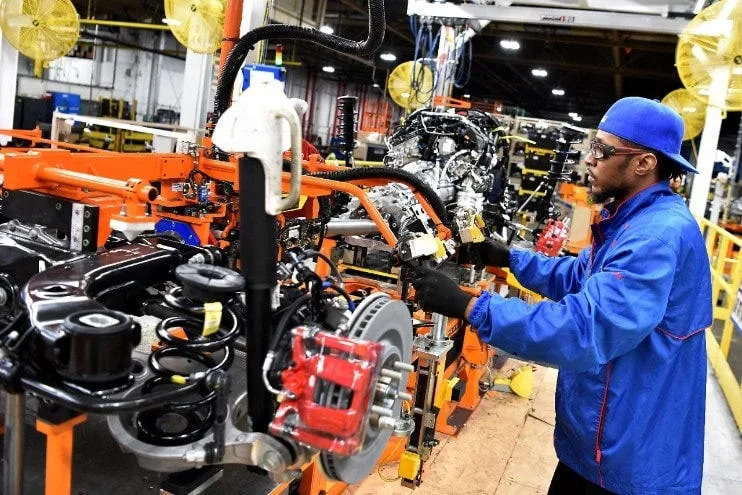General Motors may have a slight advantage over its competitors — at least in the future — as the industry faces a possible shortage of rare-earth minerals used in a variety of car components.
Many industry analysts fear that a shortage of the rare earth minerals could bring on a repeat of the pandemic-era semiconductor chip shortage that led to widespread production disruptions. Those, in turn, caused a dearth in new car inventory and a subsequent spike in new and used car prices.
Currently, China has the market cornered on processing the 17 rare earth metallic elements that go into components that are critical to vehicle production. They are also used across most electronics and even in the contrast dye in MRI machines and in some cancer drugs.
But amid the escalating trade war with President Donald Trump, China has decided to make it harder for the world to get those rare earth products. In April, the country introduced a new licensing requirement on the export of rare earth products, bringing global exports of them to a near halt.

As delegations from the United States and China meet in London the week of June 9 to talk about a new trade deal, it is expected that discussion about an agreement on opening up the exports of rare earth minerals will be on the table. Late in the evening of June 10, media reports said progress had been made to de-escalate the trade war. Industry observers say it's critical for the Detroit automakers that a deal is reached.
"With this weight hanging over their head it is a very serious thing if the current administration doesn’t negotiate this right with China," Sam Fiorani, vice president of global vehicle forecasting at AutoForecast Solutions, told the Detroit Free Press. "There will be limitations on the products being imported and vehicle production could be hampered very quickly."
Here's where GM comes in. About four years ago, the automaker formed strategic alliances with two rare earth mineral processing companies to domestically source rare earth minerals and process them into the components GM uses in its electric cars. While the partnerships are not a total panacea to the problem yet, some analysts said GM will be in a position of strength one day.
“They’re not online yet," said Sam Abuelsamid, vice president of market research at Telemetry, of the rare earth mineral processing factories. "So, in the immediate future, it’s not going to help them much. But longer term, having a more diversified supply chain of rare earth materials, will definitely be helpful.”
What are rare earth minerals?
Despite the name, rare earth minerals are not rare. In fact, they are the most abundent minerals on the planet, Abuelsamid said. They are the primary element in rare earth magnets, which are used in EV motors and almost every consumer electronic device. They are used in the parts of your car that use little motors such as electric seat adjusters, windshield wipers, exterior side mirrors and so forth, he said.
"There’s plenty of (rare earth minerals) in the Unites States, but we don’t have much in the way to process it," Abuelsamid said. "China has a stranglehold on these right now. So they want to make it as costly as possible, particularly for American companies, to get these materials."
If a company wants to bring rare earth minerals or products, such as rare earth magnets, from China, it has to go through various permits to export them. The other option is to export a finished product, such as an EV motor, that already has the rare earth magnet installed inside it. China will allow the latter. But doing that means paying the tariff — the tax an importer pays to bring a good across a border — on the entire product rather than merely on the raw materials, Abuelsamid said.
Fiorani said one of the reasons it’s so cheap to get rare earth minerals from China is because China's government regulations to extract and process the minerals are lower compared to those in North America or Europe.
How much supply do U.S. companies have of rare earths?
Last week, China tentatively opened up the exports of rare earth materials, but Fiorani said that’s likely a negotiating play for future trade assistance such as loosened tariffs out of Washington. He said he believes the Chinese auto companies want to start selling cars here as soon as possible — a competition that the Detroit Three want to avoid.
So far, high tariffs on Chinese cars have kept Chinese vehicles from being sold in the U.S. But, Fiorani said the Chinese "could potentially hold the market hostage with some of these minerals" and shut down most vehicle production and the production of other products.
U.S. companies have two or three months’ worth of supply of rare earth minerals, according to a CNN report that attributes that data to Gracelin Baskaran, director of the Critical Minerals Security Program at the Center for Strategic and International Studies. After that, Baskaran said the “industry simply could not manufacture” unless an agreement is reached between the United States and China.
“I suspect China knows where the choke points are and if you want to inflict discomfort, where’s the low hanging fruit?" Mike Wall, executive director of Automotive Analysis at S&P Global Mobility, told the Detroit Free Press. "Rare earths is one of them because China has such a hold on the processing. With one mandate you can literally take down — beyond autos — multiple industries.”
But National Economic Council Director Kevin Hassett on June 9 told CNBC’s “ Squawk Box ” that he expected a deal on rare earths to be struck quickly.
GM's deal to source rare earths
A GM spokesman declined to discuss the automaker's current position with its supply of rare earth minerals or its strategic alliances given the sensitivity of the current global trade discussions.
But in 2021, GM formed a strategic alliance with MP Materials, which owns and operates a rare earth mine and processing facility in Mountain Pass, California, the only active and scaled rare earth production site in America. MP Materials broke ground in 2022 on its first rare earth metal, alloy and magnet factory in Fort Worth, Texas , where it will take the mined minerals and make them into finished alloy and magnets for GM's EVs starting later this year.

In 2021, GM also formed a strategic partnership with VAC of Germany , a global producer of advanced magnetic material, to build a plant in Sumter, South Carolina. The plant, which will operate under VAC's e-VAC Magnetics division, will use locally sourced raw materials to manufacture permanent magnets for the electric motors used in the GMC Hummer EV, Cadillac Lyriq, Chevrolet Silverado EV and more, VAC said in a media release. That plant is expected to start production early next year.
Similarly, in 2023 Stellantis — the company that makes Chrysler, Dodge, Jeep, Ram and Fiat — signed a tentative agreement with NioCorp, a rare earth minerals mining company in Nebraska, to develop a rare earth magenetic supply chain. A Stellantis spokesperson did not immediately respond to an inquiry as to the status of that deal.
But Reuters reported that NioCorp is developing a rare earth project in Nebraska scheduled to start production within three years.
Last year, rare earth company Carester SAS in France said it inked a sales agreement with Stellantis over an initial 10-year period to provide "over 3,400 (metric) tonnes of neodymium, praseodymium, dysprosium and terbium oxides, 36% of which are recycled."
The impact on Ford
In early May, Ford Motor Co. temporarily shut down production for about 10 days at its Chicago Assembly Plant where it builds the Ford Explorer, Police Interceptor Utility and Lincoln Aviator because of a shortage of critical minerals needed for the braking systems, according to media reports .

Ford CFO Sherry House said on June 4 that Ford has taken action to mitigate any disruptions from the export controls China has put on rare earth minerals.
"You have to look for alternative parts or alternative ways to get things," House said. "Frequently, it goes through, it just may take more time. So then you might be facing expedited shipment costs that you weren’t anticipating and it just puts stress on a system that’s highly organized with parts being ordered many weeks in advance."
She said Ford has been managing the issue so far, but warned, "I don’t know if at some point this is going to be a larger issue for us?"
It has become an issue for other automakers. Suzuki Motor suspended production of its flagship Swift subcompact from May 26, citing a shortage of components, according to Reuters. It expects a partial restart on June 13, with full resumption after June 16, Reuters reported.
Several European auto supplier plants and production lines have been shut down because of a rare earth shortage, Europe's auto supplier association CLEPA said on June 4. BMW said a part of its supplier network was affected by the shortage, but that its own plants were running as normal, Reuters reported.
What's the long-term answer?
Automakers have been trying to wean off their dependency on China for rare earth products for awhile, Fiorani said, but it takes time and money to build up the scale in this country to produce rare earth products that meet their vehicle production demands.
Wall said the industry has stockpiled some of the rare earth magnets precisely because of its known vulnerability to China. But it is hard to keep track of those stockpiles. Plus, those who could be impacted by this problem extends beyond the auto companies that directly use rare earth products, Wall said.
"I was talking to a supplier of exterior trim. They don’t use any magnets in their products so one would think you’re not having to chase down the rare earth minerals," Wall said. "But they said they are as vulnerable as everyone else because the programs they supply, if that assembly plant is taken offline, the automaker won’t need their product either. So it brings them offline."
During the semiconductor chip shortage a few years ago, automakers could build a vehicle with the missing chip, park it and then install the chip parts later once they came in stock. Rare earth components are in so many parts of the vehicle, it's impossible to partially build them and then complete them later. Instead, all production has to stop if there is a shortage, Wall said.
The near-term solution to the problem, he said, is to get a trade deal with China. But longer term, the United States has to start processing rare earth minerals, too, and it has to get additional trade deals with friendlier countries who will process rare earth minerals.
Until then, he said there is widespread concern in the auto industry over this problem.
"There’s a level of powerlessness. There’s a clear air of vulnerability," Wall said. "Some of the largest of the largest automakers are in a pickle, too. The supply chain gets it. Everybody’s heightened to it and the problem is you don’t have a lot of control. Even if you try to throw money at it, it’s not going to yield much in the near term. It’s that processing itself because so much of it is coming out of China.”
More: From sourcing rare earth minerals to internal changes, 5 takeaways from chat with Ford CFO
More: Ford Bronco, Bronco Sport missed top safety ratings for this reason
.
This article originally appeared on Detroit Free Press: GM's got an advantage in a worrisome rare earth minerals trade war

